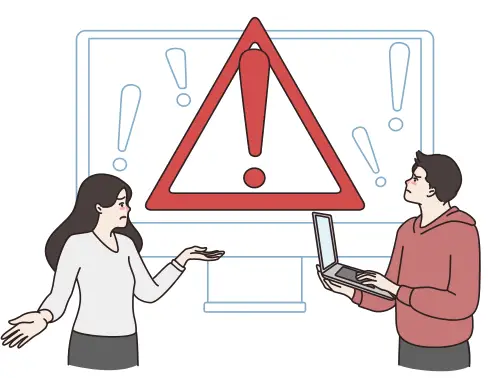Contents
Toggle
Meet David De’ Ath, founder, editor, and writer at Wonderful World English. With his extensive background as an English teacher, David provides valuable insights and practical tips on ESL for students and teachers alike.
Over the past several years, we have witnessed a transformation in how learning is done around the world.
Due to developments in computer technology and more sophisticated platforms, online learning is now a preferred method of study for millions of young and old students.
With this rise in the demand for online learning, there has been a correlating increase in demand for online teachers.
There are several advantages to pursuing a career in teaching online, but it doesn’t come without drawbacks. It can be very convenient and doesn’t require as much planning as regular teaching, but on the other hand, online teachers have to put up with technical problems and less engaged students.
I have several years of online teaching experience and experience in traditional teaching.
My field is teaching English as a Second Language (ESL), but what we will cover today will also apply to other subjects.
If you’re wondering whether online teaching is a good career option, you’re in the right place!
Let’s dive into the many aspects of online teaching as a career choice and explore the good and the bad of this increasingly popular option.

Benefits of Online Teaching
The benefits outweigh the drawbacks when teaching online, so let’s cover these aspects first!
Below are the top three advantages of online teaching:
1. Convenience
Convenience is one of the most appealing aspects of online teaching and cannot be overstated so I had to put it at the top of the list.
Who doesn’t love convenience?!
It’s such a great time saver to log in and teach a class from practically anywhere in the world with an internet connection.
This allows online teachers to strike a better balance between their personal and professional lives, where they have more freedom in when and how much they work.
Especially when compared to teaching in a classroom setting, which will typically require much more planning, online teaching is far superior in its flexibility.
So, for anyone who prefers remote working and wants a more relaxed schedule, a career in online teaching may be a great option.
That being said, some people much prefer a more structured schedule where they can build their routine around that.
But for most of us, having the flexibility that comes with online teaching is a huge plus.

2. Rising Demand
Due to its convenience, flexibility, and value, online learning continues to grow everywhere.
This is a huge advantage for anyone concerned about job security.
Since the start of the decade and the advent of the Covid-19 pandemic, the demand for online teachers has gone through the roof.
From universities and high schools to language centers and beyond.
As I mentioned earlier, my online teaching experience is mostly within ESL.
These kinds of jobs are also rising in demand and can offer great earning potential, either as a primary or secondary source of income.
If you’ve ever wondered whether a career teaching English online is worth it, you should check out the article below!
Related Article: Is Teaching English Online Worth It? – Teacher’s Answer

3. Global Reach
Another great benefit that comes with online teaching is the global reach it provides.
Unlike traditional teaching, online educators can connect with students worldwide.
This means no more geographical barriers, giving access to countless people who would have otherwise not had the chance to study with you.
This opens up a vast pool of potential learners and offers an enriching teaching experience.
It is also a great way to network and grow within education, improving an online teacher’s prospects.

Challenges of Online Teaching
Of course, we can’t have up without down.
There are a few hurdles that can come with online teaching, but none of them can’t be overcome.
Let’s look at the three biggest barriers to online teaching:
1. Technical Difficulties
This is something that can happen to anyone who is using technology to teach or study.
It has been the bane of many online teachers when an issue arises, and it affects the momentum of the lesson.
Technical difficulties can come from Wi-Fi problems, crashing software, and hardware issues such as glitchy cameras or microphones with annoying echoes.
As an online teacher, I can say that technical issues are not as commonplace as some people may think, but they do indeed happen.
There is typically a lot of support online, and most issues get fixed promptly.
I’ve taught countless online classes and never had one canceled because of a technical problem.
But it can happen, and I know people it has happened to.
So, anyone considering a career in online teaching should be aware of this and be prepared to overcome the reality of dealing with technical problems.
Being able to troubleshoot issues and figure out how to fix them as they arise will greatly help anyone involved in online teaching.

2. Limited Physical Interaction
Compared to traditional teaching, online teaching lacks anywhere near the same level of physical interaction.
You may have heard before that communication is 93% non-verbal.
Well, it doesn’t seem to be that high of a percentage, but it still rings true that a large portion of communication is non-verbal.
It was Albert Mehrabian, a researcher of body language, who first broke down the components of a face-to-face conversation. He found that communication is 55% nonverbal, 38% vocal, and 7% words only.
The University of Texas Permian Basin
Non-verbal cues and face-to-face engagement being limited online can sometimes affect the student’s ability to focus and engage.
Online educators must find creative ways to foster student engagement and build connections virtually.
An online teacher needs to speak, face the camera, and try to involve as much interaction as they can.
If you’re interested in learning more about the differences between online learning and face-to-face, you should check out the article below!
Related Article: Is Online Learning as Good as Face-to-Face Learning?

3. Less Structure
Another big drawback that can affect online teaching is that educators must work independently and keep on top of their timekeeping.
For some, this is no problem, but for others, this can be difficult.
If you don’t struggle with punctuality and scheduling, this won’t be an issue.
But if you struggle with this, I would suggest working on this before considering a career in teaching online.

Why a Career in Online Teaching is Worth it
So, taking all into account, you must be wondering if pursuing a career in online teaching is worth it!
Well, the truth is, it depends on you.
Everyone is different and has their own individual wants and requirements for what they consider to be a good career choice.
Personally, I think a career in teaching online can be a very rewarding one indeed.
It provides plenty of opportunities to earn a good living, along with many other benefits that can be enjoyed by those who don’t wish to work in an office setting.
Let’s cover in some more detail why exactly I think a career in online teaching can be a great choice:
1. Growing Demand
As we covered in the benefits of online teaching, the demand is growing year-on-year, and this shouldn’t be understated.
This is a huge advantage for anyone involved because it offers much growth potential.
And, as technology evolves and online platforms improve, the demand will surely continue to rise.
With rising audiences seeking to pursue their studies remotely, this can mean that an online teacher feels secure in the knowledge that their career path will likely not end soon.
I think a career in online teaching can be a great option for anyone who wants long-term stability.

2. Job Opportunity
Another great element of a career in online teaching that shouldn’t be understated is the opportunity it offers.
This ties in with number one, the growing demand.
With educational institutions becoming increasingly digitalized to reach wider audiences, there will only be more jobs available for experienced and qualified teachers.
An online teacher could teach more than one subject; they could teach young learners or adults.
There is a lot of variety that can provide more exciting opportunities as we advance.
There is even the chance of starting their own online school or private tutoring service.

3. Income
A career in online teaching could be very rewarding financially.
The amount an online teacher gets paid will depend on factors such as experience, qualifications, and the specific educational institution or platform.
While some online educators may work on an hourly basis, others may be employed as full-time instructors.
Generally, online teaching offers competitive wages, and experienced educators with specialized knowledge can often command higher salaries.
And with increasing demand, wages and benefits for experienced teachers will also improve.
A beginner online teacher could earn anywhere between $15 – $35+ per hour.

4. Job Satisfaction
Another huge reason I think a career in teaching ESL can be worth it is its satisfaction.
It’s an awesome feeling to work remotely, and the level of physical exertion is overshadowed compared to what is required for traditional teaching.
Online teaching could be perfect for anyone passionate about education while yearning for flexibility.
I have had countless online students, and watching them develop with me provided me was very rewarding.

How to Succeed in Online Teaching
Now we’ve covered why a career in online teaching can be a great fit, let’s find out what two things are essential to succeed in this field:

1. Skills and Qualifications
To excel in online teaching, certain skills and qualifications are essential.
First and foremost, an online educator must possess in-depth knowledge of their subject areas.
On top of this, they should be adept at using various online teaching tools and platforms and not be overwhelmed by technical difficulties.
Strong communication and interpersonal skills are also crucial for effectively engaging with students in a virtual setting.
This means speaking clearly and being comfortable with having their faces on camera.
As previously mentioned, my experience with online teaching is via ESL, which will require at least a Teach English as a Second Language (TEFL) qualification.
Click the link below to find out more!
Related Article: Is TEFL Worth It? The Pros and Cons of TEFL Certificates

2. Be Equipped
Online teaching relies heavily on technology and various digital tools, so teachers must have everything they need to teach effectively.
Check the list below to see all the essentials to be properly equipped for a career in online teaching:
- Computer or Laptop.
- High-speed internet connection.
- Webcam.
- Microphone.
- Headphones.
- Software.
Online educators must be comfortable using this equipment and able to navigate the proper software.
Additionally, access to digital textbooks, multimedia content, and interactive learning materials will improve the quality of any online teacher’s sessions.

Conclusion
In conclusion, online teaching can be a great career choice for anyone who loves education and flexibility.
It is a growing industry that is becoming increasingly sophisticated and will likely continue to expand in the coming years.
Online teaching has some setbacks, mostly in technical issues and lack of physical interaction with students, although these can be effectively overcome.
If a career in online teaching sounds right for you, be sure to obtain the necessary qualifications and equipment if you haven’t already done so.
As technology advances and demand rises, online teaching will likely become even more prevalent.
This means more exciting opportunities for educators to impact the world of education for years to come!
We hope this helps you better understand online teaching and whether it is a good career path.
Image Attribution: All images licensed via canva.com





